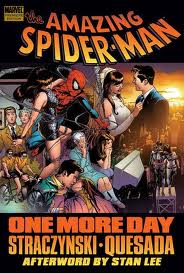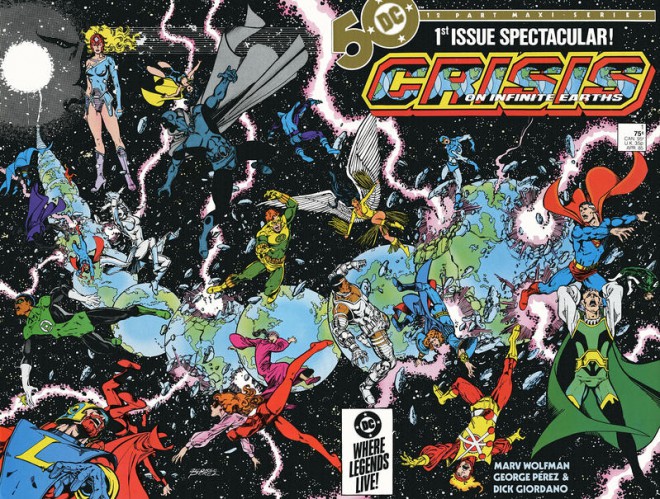I, Reboot (Part II)
Casting off my weak and overused metaphor of a motor vehicle for a moment, I will tell the story of a “word,” and how it semiotically multiplied into a conceptual hubbub of meanings, and why. My thesis deconstructs the reboot term and I shall share with you what I have uncovered. It is not often, if ever, we get to see a word, a single, linguistic seed, evolve from the neologistic birth canal into a semantic formation.
And before you get your knickers all twisted up in a poststructuralist knot, it is necessary to construct definitions before we can even begin to analyse, examine and debate how cultural processes operate. The idea that concepts can be interpreted any which way possible is to misinterpret poststructuralism that suggests that language.
Let’s get down to brass tacks here. The term “reboot” – as in rebooting your computer – is only forty-three years old, its birthday being 1971. Relatively speaking, that’s a squealing, squawking baby! If words could grow legs and arms, reboot couldn’t even clench a fist, let alone walk or run.
 Etymologically, a reboot-as-narrative-analogy is even younger, a foetus, a seedling even (1989 is its birthday according to the Oxford English Dictionary). Many have commented that the reboot narrative concept comes from the comic book medium. Indeed it does. But this is where the problems begin, you see? This is where the genre process and rebooting get all entangled and entwined in a Gordian knot of conceptual hodge-podge. Comic books have been rebooting for decades, since “minute zero,” as Michael Chabon calls the publication of Action Comics #1 which introduced the world to Superman in 1938.
Etymologically, a reboot-as-narrative-analogy is even younger, a foetus, a seedling even (1989 is its birthday according to the Oxford English Dictionary). Many have commented that the reboot narrative concept comes from the comic book medium. Indeed it does. But this is where the problems begin, you see? This is where the genre process and rebooting get all entangled and entwined in a Gordian knot of conceptual hodge-podge. Comic books have been rebooting for decades, since “minute zero,” as Michael Chabon calls the publication of Action Comics #1 which introduced the world to Superman in 1938.
Not true.
To be sure, comic books have always sufficiently engaged in periodic revisions, regenerations and reformations. As Geoff Klock has argued, one of the principle reasons why long-running vast narratives, such as DC and Marvel, have managed to expand and enhance their brand “life” is by delicately dancing the dialectic between standardisation and differentiation to great effect as an elemental part of their survival code, a kind of Darwinism, a natural (textual) selection.
This is how all texts operate and not a description of the reboot process. “Mere repetition would not satisfy an audience,” claims Steve Neale. I concur, Steve. For Derek Johnson, “product differentiation is the key to profit.” Well said, Derek. Or, as Stringer Bell would no doubt say: “word” (which is cool-talk for “definitely,” or so I am led to believe).
What, then, is a reboot, I hear you ask?
In 1986, DC Comics sought to purge their labyrinthine story-program of continuity errors and a narrative history that deterred potential “newbies” from jumping on-board. Sales had been declining rapidly for over a decade and Marvel “ruled the roost.” A twelve-part mini-series, Crisis on Infinite Earths, was the answer to their problems. Annihilate the DC Universe and start over from scratch. In short, reboot the system. Wipe away a publication history and begin again with a new story-program.
To be sure – and I do not mince my words here – engaging with the DC comic book hyperdiegesis at that time could not have been helped by three PhDs in Quantum Physics, a Macarthur Grant and a five-year long sabbatical from life, the universe and nutritional necessity! Douglas Wolf describes fans who can successfully navigate the chaotic contours of the DC and Marvel hyperdiegetic continuities as “super-readers.” I think this does them a disservice. Comic book readers of the 1980s who consumed and understood the continuity are nothing less than geniuses, gurus, veritable professors of alternate realities and monstrous geographies. I say award them MBEs, each and every one of them. Stick ‘em in a laboratory and watch them create the time machine. Hell, throw in a Delorean, let’s see life really imitate art….
 The notion that comic books have been rebooting since its inception is misleading and fallacious. One technique which DC and Marvel have adopted over the years is that of the “ret-con,” an abbreviation of “retroactive continuity.” A ret-con retroactively changes continuity by altering the details of an event in the past to make sense of a current storyline. Sometimes this technique can be extreme, such as the Spider-Man arc, One More Day, which ret-conned Peter Parker and Mary Jane Watson’s marriage out of continuity – and created a fan backlash in the process for good reason: it was just too darn silly!
The notion that comic books have been rebooting since its inception is misleading and fallacious. One technique which DC and Marvel have adopted over the years is that of the “ret-con,” an abbreviation of “retroactive continuity.” A ret-con retroactively changes continuity by altering the details of an event in the past to make sense of a current storyline. Sometimes this technique can be extreme, such as the Spider-Man arc, One More Day, which ret-conned Peter Parker and Mary Jane Watson’s marriage out of continuity – and created a fan backlash in the process for good reason: it was just too darn silly!
It is not only comics that engage in ret-conning. If anyone remembers Dallas, and the infamous season where Bobby Ewing is killed and is miraculously resurrected the following year. How did he return? It was all a dream! This ret-con wiped away an entire season’s worth of episodes in one fell swoop. Of course, it was all downhill from there and Dallas had “jumped the shark.”
A ret-con is not a reboot. A reboot wipes away a publication history or, in film or television, a screen history and begins again with a new syntagmatic layer.
Of course, rebooting can never truly wipe the slate clean. The slate is a palimpsest and contains all the traces and ghosts of previous incarnations. However, we can see (hypothetically) intertextuality and dialogism spiralling along a horizontal axis – the paradigmatic – and the story itself unfolding sequentially along a vertical axis which is the syntagm. Intertextuality may “destroy the linearity of the text,” as Laurent Jenny argues, but linearity is still preserved. I prefer to understand narrative as a dialectic between linearity and non-linearity, chaos and order, paradigm and syntagm. Intertextuality vandalise the text while at the same time readability is guaranteed. As Mark J.P Wolf states, “without causality, narrative is lost.”
Next time, I shall illustrate how the reboot terminology has been marshalled by academics and journalists in ill-conceived ways, one which has birthed a buzz word – fuzz-word even – that has set in motion a range of non-sequiturs.





Thanks for this, William. Thinking aloud, and with the acknowledgment I don’t want to dive too far into the semiotics of the case before you’ve finished it, I do wonder what we call something like J.J. Abrams’ Star Trek that is undoubtedly rebooting the series but actively builds in existing continuities. It’s a case where the industrial logics of a reboot remain, but with a close attention to the logics of continuity to avoid either entirely overwriting or entirely remaining faithful to existing continuity. It makes me wonder—perhaps outside of the scope of this single post, if not the project as a whole—whether or not the industrial terminology you’re interrogating has resulted in the self-aware reboot (Star Trek) versus those that tend to comparatively ignore the intertextuality unavoidable within the reboot process.
Thanks Myle. Interesting thoughts. In my thesis, I argue that Abrams’ Star Trek is not a reboot. It fits in with the already-existing narrative sequence and even serves as a sequel to TV series Enterprise (which ironically is the only text that is canon in both timelines). It also acts as a sequel to Nemesis or at the very least the original timeline with the transmigration of Spock. Delving into the hyperdiegetic continuity of Trek, one is faced with many examples of parallel worlds and alternate realities and Abrams’ ‘fork in the road’ can be seen from this perspective. Abrams’ Trek also serves as a paraquel (see Mark J.P Wolf). A reboot ignores an already existing narrative sequence whereas Trek ’09 is concretized as a part and parcel of the pre-established universe – or, more accurately, multiverse. If one follows the reboot process from the comic book site of origin as framing principle, then Trek ’09 is not a reboot. Of course, you are free to disagree – in fact, I encourage it! But what lies at the heart of the reboot premise is wiping the slate clean. Trek ’09 adds new files to an already existing story-program.
Thanks for the interesting post on reboots. You speak a lot about what a reboot isn’t, but do you offer a definition of what a reboot is in any of your posts? My apologies if I missed it.
Hi Eric,
Yes, I defined a reboot in Part I of the series. /2014/05/08/i-reboot-part-1/
Thank you. The definition you provide is very exclusive. You say that the computer term “reboot” is about 40 years old. All subsequent uses of the term in comic book and film discourse are then figurative uses that mean to draw some analogy between restarting a computer and restarting a story. But by providing a very exclusive definition of one figurative use of “reboot”, and by stating that other figurative uses of the term are incorrect, you are inadvertently arguing that there is (and has only been) one correct way for people to use the term “reboot” in order to form an analogy between computers and stories. Why go so far as to say that some uses are incorrect? Why not simply provide a set of definitions for all the ways that “reboot” has been used in film and comic book discourse? This would still clarify many of the misunderstandings that you highlight, but it would do so without asserting a sense of right and wrong into the conversation.
Small point. Isn’t it “retcon” rather than “ret-con”? I’ve always seen the former spelling rather than the latter, and I recall “retcon” being the spelling when the word first appeared and started to be used on rec.arts.comics on Usenet in the late 80s/early 90s.
Thanks Eric. I see what you’re getting at – but without a coherent definition, how can we begin to discuss how industry, text and audience operate? In my thesis, I do examine how the word is being used in discourse, but I think some uses are ill-conceived and a part of how buzz-words become fashionable. Why can we define a sequel, for example, and not a reboot? I think definitions of sequels and prequels are ‘exclusive,’ too. Will Brooker points out that some people use the term ‘deconstruction’ erroneously. Is that ‘exclusive’? Indeed, signifiers must have some exclusivity or they lose all their moorings. Providing a set of definitions for discursive uses is one thing, but they should be challenged I think to construct a coherent definition. Without a definition, the concept becomes useless. Of course, you’re free to disagree.
Thanks Kaitlin – I think ‘retcon’ is the right spelling, unhypenated so thanks for pointing that out.
Good points, but I think you might be presuming that a coherent definition is ‘one word, word meaning’ when plenty of words — like text, audience, technology, and media — all have multiple meanings within the industry and scholarship. It is not only possible to discuss the industry while acknowledging the many uses of these words, in many ways it is necessary when trying to understand how the industry works and how people within the industry are conceiving of their work. Further (and this is now just a side point), but the difference between sequel and reboot is that sequel is a literal reference to a sequence or series, whereas reboot is a deliberately playful comparison between stories and software. Being that your definition of reboot is already stretching the technological use of the term in order to make one type of playful comparison, I don’t think you’ve made much of a case in suggesting that other playful comparisons (such as one offered by Chabon) are in anyway less valid. That said, your dissertation sounds like a great contribution to Dark Knight and franchise studies, and it looks like it is already starting the types of discussions that most doctoral candidates only hope to incite.
*make that ‘one word, ONE meaning’
I agree with everything you say Eric, and thank you for your articulate thoughts. I think that words like text and audience, for example, are not the same. I am not trying to essentialise here – although I have been called such! My thesis seeks to determine what the word means in a certain context. The fact that it may be used discursively in other ways and come to mean more and more things as the word evolves is something I accept wholeheartedly. I am simply trying to ‘clear the ground,’ as it were so that further studies of reboots and otherwise can continue into the future. Here’s what Will Brooker had to say and I thank him for his insights:
‘a reboot has to have some specific meaning because I think the terms used in scholarly discussion must be associated fairly precisely with a specific meaning, or they are not useful. I feel the same way about “deconstruction,” for instance – I think it’s broad and inexact use in journalism, and in some academic work, has been unhelpful. Cultural Studies is not science, and everything we do is part of a “series of debates” but I do think we have to have a reasonable agreement about what key words mean. “Reboot” is not the kind of word we can never pin down, like “culture or “realism”. I don’t think it needs to be complicated or unclear.’
Just to make explicit: the reboot as wiping the slate clean and beginning again is not MY exclusive concept. The concept emerged from comic book fandom so perhaps a reboot means different things to different interpretative communities. Here’s Thomas R Willits description: A reboot ‘restarts an entertainment universe that has already been previously established and begin with a new storyline and/ or timeline hat disregards the original writer’s previously established history, thus making it obsolete and void’ (2009).
Eric Burns: Finally, we have the major event. The big one. The big block of cheese in the White House lobby. The retcon that completely starts everything over. This retcon is often called a ‘reboot,’ because that’s what it does. It starts from the very beginning, wiping clean all continuity so new readers can jump right in. Everything’s up in the air because nothing’s happened yet.
Even Wikipedia: In serial fiction, to reboot means to discard all continuity in an established series in order to recreate its characters, timeline and backstory from the beginning.
I offer these examples to illustrate that I did not invent this use of the word.
Hi Eric,
did you say Chabon offered a playful comparison somewhere? Be interested to read that please if you know where to find it. Many thanks
Yes, I thought you were saying that Chabon used the term reboot in his “minute zero” comment, but I may have misread it.